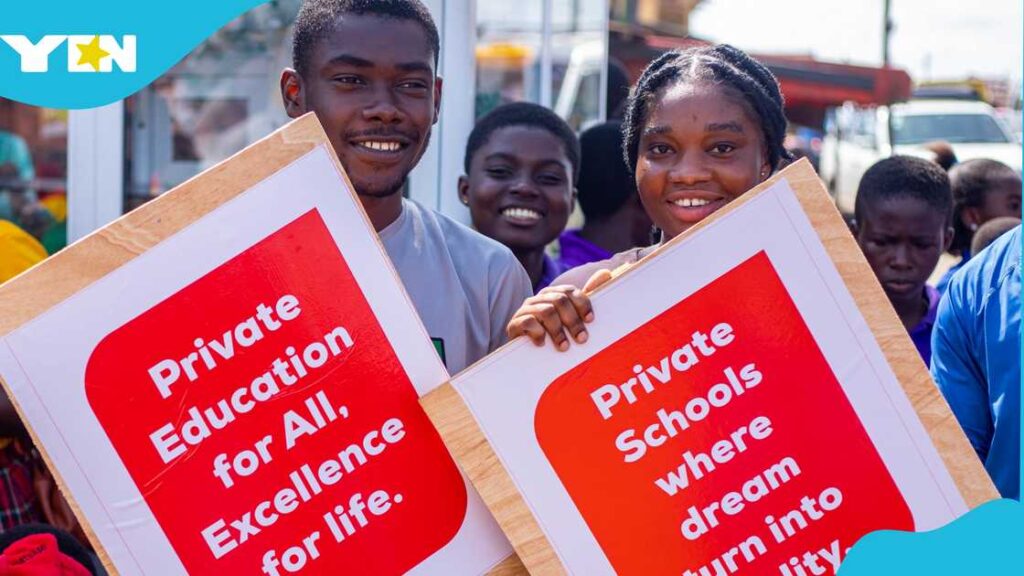The Executive Director of the Ghana National Council of Private Schools (GNACOPS), Mr. Enoch Obengfo Kwasi Gyetuah, has praised the National Democratic Congress (NDC) government for acknowledging the role of private education in the country by including them in the Free Senior High School Policy.
He stated that Ghana’s education cannot be defined without the input of private schools, so he welcomes this new development to ensure that private schools can benefit from the policy.
Mr. Gyetuah disclosed that at least 60 private schools have begun the pilot project, and more private schools will be added in the future as they continue to receive letters of interest from schools wanting to join the free SHS policy.
He mentioned that this will foster better collaboration between private schools and the government to enhance the quality of education in the country.
“In the past, there wasn’t a mutual platform like this, but now we have a space where every Ghanaian can see and acknowledge the contributions of private schools as recognized by the state and government. We should view this as a significant developmental step that we have achieved and contributed to the free SHS policy,” he said.
In an exclusive interview with The New Republic Newspaper (TNP), he discussed the upcoming Annual Education Leadership Summit program, which will take place from August 11 to 15 at Bunsu Cocoa Research College near Linda Door on the Accra-Kumasi Highway. He noted that the council often hears about overcrowding in public schools, while facilities in private schools that could accommodate some of these students are left unused.
Now that the government has taken this step, we need to support it. This will also allow teachers who were previously sent from private schools to be reinstated and continue their work in those schools.
Highlighting the importance of this year’s annual education leadership summit, Mr. Gyetuah mentioned that the event will showcase new government policies, including the review of free SHS policies by incorporating some private senior high schools into the free SHS framework, government incentives to assist private schools, and the roles they will play.
Key Stakeholders in Education
Mr. Gyetuah stated that the summit will gather key figures in education, such as investors, the Ministry of Education, Ghana Education Service, National Council for Curriculum and Assessment (NaCCA), National Teaching Council, Parliamentary Select Committee on Education, Eastern Regional Minister, and many others to hear the government’s plans for private schools in education.
The Director noted that the government has embraced a national theme, “Transforming Education for a Sustainable Future.” He emphasized the importance of private schools, which is why “we are inviting all schools nationwide to take part.”
He pointed out that private schools face challenges with transportation, so the council has secured investors to assist private schools in acquiring buses by partnering with organizations that will supply buses on an installment or flexible payment plan, based on the financial capacity of each school.
Tackling Challenges
Another focus of this Summit will be to address the challenges faced by private schools regarding assessments, particularly BECE issues, the role of the National Schools Inspectorate Authority (NaSIA) in private education, and to provide teachers with training on continuous professional development, with certificates awarded to participants.
For the first time in the history of private education in Ghana, GetFund is collaborating to ensure that private school teachers benefit from GetFund support and programs to further their education, and thus, he urged all private school teachers to attend the event.
Advice on Ghana’s Education
“I want to take this chance to explain a statement made by a media outlet regarding my comment that Ghanaian youth lack the skills for employment. My statement was about how Ghana’s education system has failed our youth, resulting in a lack of employability skills.”
He believes that every parent dreams of their children gaining specific expertise. Therefore, if the education system does not produce that expertise, it indicates a failure of the system, leaving people without employability skills.
“What I mean is that Ghana’s education system needs a complete overhaul to improve the understanding of educational concepts,” he said.
Mr. Gyetuah mentioned that TVET education should not be viewed as a secondary option to traditional education. He emphasized that TVET should not only be available in senior high schools but should have its curriculum starting from preschool.
By Philip Antoh


